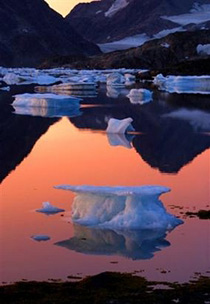 |
 |
 |
 Editorials | Environmental | December 2005 Editorials | Environmental | December 2005  
Climate Change Major Environmental Challenge for Europe
 Associated Press Associated Press


| | An iceberg floats in the bay in Kulusuk, Greenland near the arctic circle. British oceanographers reported in Dec. 2005 that Atlantic currents carrying warm water toward northern Europe have slowed. Freshwater from melting northern ice caps and glaciers is believed interfering with saltwater currents. Ultimately such a change could cool the European climate. (AP/John McConnico) |
Brussels, Belgium - Climate change is Europe's biggest environmental challenge, as the temperature on the continent is rising a third faster than the global average, according to a report by the EU's environmental agency.

The three hottest years on record were the past three - 2002, 2003 and 2004 - as Europe's average temperature rose by 0.95 degrees Celsius (1.71 degrees Fahrenheit) during the 20th century, says the study by the Copenhagen-based European Environment Agency.

"The report provides compelling evidence that fundamental challenges remain. Climate change is one of the most obvious ones," said European Commission Vice President Margot Wallstrom in the European Parliament, where the report was presented Tuesday.

The report, a five-year assessment covering 32 countries - the 25 EU member states plus Bulgaria, Iceland, Liechtenstein, Norway, Romania, Turkey and Switzerland - says 10 per cent of Alpine glaciers disappeared during the summer of 2003 and three quarters of Switzerland's glaciers will have melted by 2050 at current rates.

"Europe has not seen climate changes of this scale for 5,000 years," said Jacqueline McGlade, the agency's director. "Without effective action over several decades, global warming will see ice sheets melting in the north and the spread of deserts from the south. The continent's populations could effectively become concentrated in the center."

Apart from climate change, other areas of concern include biodiversity, marine ecosystems, land and water resources, air pollution and health.

"The loss of biodiversity is a fact, species are disappearing, pollution hotspots remain that damage public health," Wallstrom said

Past EU environmental legislation has worked, the report says, with cleaner water and air, a ban on some ozone-depleting substances, and cars with dramatically lower pollution levels.

But it has taken 10 to 20 years to deliver results, and the pace of environmental destruction is faster than EU policy changes. | 
 | |
 |



